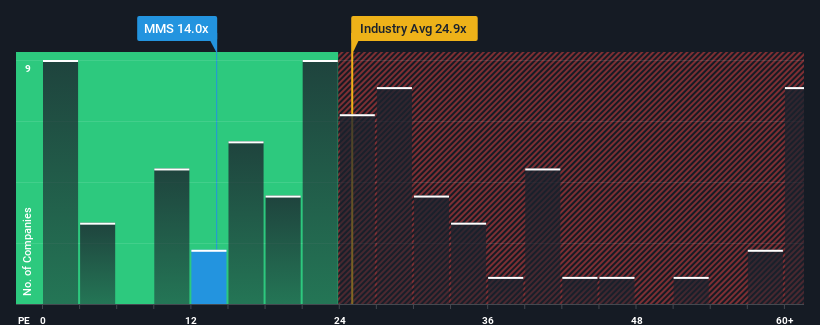- United States
- /
- Professional Services
- /
- NYSE:MMS
Maximus, Inc.'s (NYSE:MMS) Business And Shares Still Trailing The Market
With a price-to-earnings (or "P/E") ratio of 14x Maximus, Inc. (NYSE:MMS) may be sending bullish signals at the moment, given that almost half of all companies in the United States have P/E ratios greater than 20x and even P/E's higher than 35x are not unusual. Although, it's not wise to just take the P/E at face value as there may be an explanation why it's limited.
With earnings growth that's superior to most other companies of late, Maximus has been doing relatively well. One possibility is that the P/E is low because investors think this strong earnings performance might be less impressive moving forward. If not, then existing shareholders have reason to be quite optimistic about the future direction of the share price.
Check out our latest analysis for Maximus

How Is Maximus' Growth Trending?
There's an inherent assumption that a company should underperform the market for P/E ratios like Maximus' to be considered reasonable.
Taking a look back first, we see that the company grew earnings per share by an impressive 90% last year. The latest three year period has also seen a 8.5% overall rise in EPS, aided extensively by its short-term performance. Therefore, it's fair to say the earnings growth recently has been respectable for the company.
Turning to the outlook, the next year should bring diminished returns, with earnings decreasing 5.5% as estimated by the two analysts watching the company. Meanwhile, the broader market is forecast to expand by 15%, which paints a poor picture.
In light of this, it's understandable that Maximus' P/E would sit below the majority of other companies. However, shrinking earnings are unlikely to lead to a stable P/E over the longer term. There's potential for the P/E to fall to even lower levels if the company doesn't improve its profitability.
The Final Word
Typically, we'd caution against reading too much into price-to-earnings ratios when settling on investment decisions, though it can reveal plenty about what other market participants think about the company.
As we suspected, our examination of Maximus' analyst forecasts revealed that its outlook for shrinking earnings is contributing to its low P/E. At this stage investors feel the potential for an improvement in earnings isn't great enough to justify a higher P/E ratio. Unless these conditions improve, they will continue to form a barrier for the share price around these levels.
It is also worth noting that we have found 1 warning sign for Maximus that you need to take into consideration.
You might be able to find a better investment than Maximus. If you want a selection of possible candidates, check out this free list of interesting companies that trade on a low P/E (but have proven they can grow earnings).
New: Manage All Your Stock Portfolios in One Place
We've created the ultimate portfolio companion for stock investors, and it's free.
• Connect an unlimited number of Portfolios and see your total in one currency
• Be alerted to new Warning Signs or Risks via email or mobile
• Track the Fair Value of your stocks
Have feedback on this article? Concerned about the content? Get in touch with us directly. Alternatively, email editorial-team (at) simplywallst.com.
This article by Simply Wall St is general in nature. We provide commentary based on historical data and analyst forecasts only using an unbiased methodology and our articles are not intended to be financial advice. It does not constitute a recommendation to buy or sell any stock, and does not take account of your objectives, or your financial situation. We aim to bring you long-term focused analysis driven by fundamental data. Note that our analysis may not factor in the latest price-sensitive company announcements or qualitative material. Simply Wall St has no position in any stocks mentioned.
About NYSE:MMS
Undervalued with proven track record.
Similar Companies
Market Insights
Community Narratives




